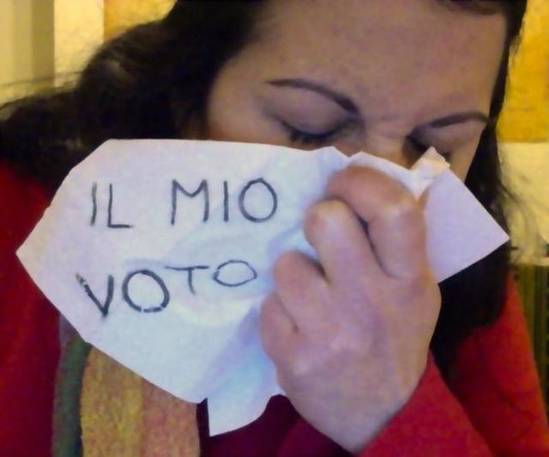


ROME
Feb. 24 and 25 will bring what commentators here are calling Italy's most important national general elections in half a century. Nevertheless, as Nichi Vendola told the foreign press in Rome Thursday, "The politicians have talked alliances, not policies, and the polls have trumped issues. It's turned into a pit bull fight."
The engaging Vendola, a leftist who has revived the formerly faltering Southern Puglia region he heads, has a point, and the result is that pit bull battle, and what lies behind it, has alienated many voters. Teresa is a hairdresser whose colleagues have given up their shops to tend to clients' hair-do's in their homes. Asked what is a stake, she replied, without hesitation, "to learn what will become of us." How will she vote? "I won't. I don't like any of the candidates." I asked two nurses the same question. "Blank ballots," they said in chorus. As a result, the turnout is predicted to be at least 10% below the 80% turnout of 2008.
Surprisingly, considering his former popularity, this alienation fallout extends even to the outgoing Premier Mario Monti, former European Union commissioner, and is being transferred to a backing away from (and sometimes downright hostility to) Germany, to the point that Monti has had to deny that Angela Merkel is interfering in the Italian elections. Monti has also come under attack for failing to decide whether he will ally himself with Pier Luigi Bersani's Partito Democratico and Nichi Vendola's group (Sinistra Ecologia Liberta', or SEL) or list to a more conservative position, stealing thunder from both Berlusconi and the Northern League.
The most successful to capitalize on the mood of alienation is the wrathful Beppe Grillo, who has made the generalized loss of illusions about the political system his stock in trade and tirade, and who is hoping to have an audience of hundreds of thousands attend his final harangue in Piazza San Giovanni in Rome Saturday. Grillo is a skilled communicator, who flings slogans into the cheering crowds like bouquets; one of his most recent is to yell, as if addressing the political class he despises, "You are surrounded - go home." Thanks to succinct messages like this, he may well deliver 100 deputies into Parliament.
The stakes remain high, and whoever wins, he (no she's; women in Italy have the lowest rate of employment in all Europe) will immediately have to face a host of problems. A financial analyst interviewed on Italian radio Thursday morning warned that, "Unless a clear governing coalition emerges after the elections, our Standard and Poor rating will slip, leaving us to pay even higher interest rates on our country's gigantic debt. We would all be the worse for that - poorer and less able to relaunch an economy that has stagnated for two decades." As if this were not scary enough, La Sette, the sole national TV network not yet absorbed into either the Italian state or Silvio Berlusconi's media networks (albeit just purchased this week by a former associate of Berlusconi), has been running daily TV reports on the desperate economic plight of middle-class Greeks, shown buying food from charity shops and the like. Italy could equal Greece, get it?
One major change in this election period is completion of the shift from allegiance to a traditional party like Christian Democracy or Socialism to loyalty to an individual leader. Political parties have morphed into fiefdoms - hence the proliferation which will make formation of a governing coalition extremely difficult, and hence the GR1 financial analyst's warning Thursday. In the worst case scenario this could lead to a stalemate and another costly, time-wasting round of elections.
Yet this is no time to waste money. Second in manufacturing capacity in Europe, Italy has had 14 years of near-zero growth, according to the London Economist, coupled with a double dip recession that began in 2007. Add to this an austerity "diet" for the past year of Monti's technical guidance of the government, plus the collapse of confidence in sovereign bonds. Industrial production has fallen even as costs of labor per unit - aggravated by Italy's particularly expensive energy prices - have risen higher than those of the rest of Europe. Confindustria figures just released show bleakly that Italy at this time simply cannot compete.
Some of the alienation, then, is from fear of the future, made worse by the daily revelations of scandal that have left few parties untouched. The arrests of the former managers of the bank Monte Paschi di Siena has tarnished the image of the Partito Democratico on the left. Then there is the colorful Oscar Giannino, whose miniscule party is called "Stop the Decline." Problem is, he is part of the decline, having invented a non-existent master's degree from the University of Chicago, and has been forced to resign as party leader.
On the right is former premier Silvio Berlusconi, who mailed nine million letters to potential voters regarding a refund, if he is elected, of the hated property tax (IMU) on first homes of families. After reading the letter, Antonio Ingroia, himself a party leader on the far left with perhaps 5% of the vote behind him, said that Berlusconi risks charges of electoral fraud. According to Ingroia, the letter actually says only that citizens have a generic right to reimbursement of the IMU, whereas in speeches Berlusconi made outright promises of its restitution. Indeed, already lines have formed in some towns with people clamoring for their money to be returned, now. Only a former magistrate, as is Ingroia, could work out the legal details for such a law suit, filed with a magistrate Feb. 19.
Source URL: http://ftp.iitaly.org/magazine/focus/op-eds/article/elections-2013-pit-bull-fight
Links
[1] http://ftp.iitaly.org/files/voto1361478173jpg